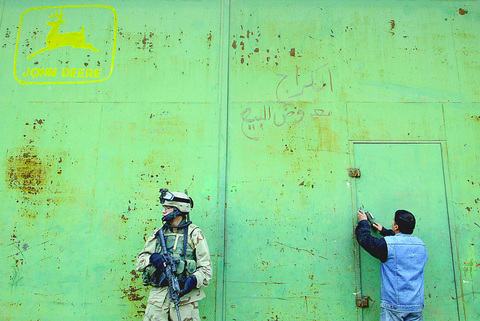Gunmen assassinated the governor of Baghdad province -- the highest ranking government official to be slain since May -- and six of his bodyguards yesterday, and a suicide tanker-truck bomber killed 10 people at an Interior Ministry commando headquarters in western Baghdad, the latest in a steady drumbeat of insurgent violence ahead of Jan. 30 elections.
Governor Ali al-Haidari's three-vehicle convoy was passing through Baghdad's northern neighborhood of Hurriyah when unidentified gunmen opened fire, said the chief of his security detail, who asked only to be identified as Major Mazen.

PHOTO: AFP
"Our convoy was moving in Hurriyah and they came from different directions and opened fire at us," Mazen said.
Al-Haidari, who was the target of another assassination attempt last year that killed two of his bodyguards, worked closely with the US-led multinational forces in Baghdad on rebuilding the capital.
He is the highest-ranking Iraqi official killed since the former president of the now defunct Governing Council, Abdel-Zahraa Othman, better known as Izzadine Saleem, was assassinated in May.
Al-Qaeda in Iraq, led by Iraq's most wanted terrorist Abu Musab al-Zarqawi, claimed responsibility for al-Haidari's assassination and the tanker-truck explosion, a statement posted on the Internet said.
"We tell every traitor and supporter of the Jews and Christians that this is your fate," said the statement on a Web site known for carrying militants' claims.
Also yesterday, a tanker truck packed with explosives detonated near an interior ministry commando headquarters in western Baghdad, killing 10 people and wounding about 60, the Interior Ministry said.
A suicide driver rammed the truck at an Iraqi police checkpoint near the headquarters, which is also near an entrance of the Green Zone, the heavily fortified area in the center of Baghdad that houses both the US embassy and Iraqi government offices. Eight Iraqi commandos and two civilians were killed, the interior ministry said in a statement.
Two US servicemen were also killed in Iraq yesterday. A roadside bomb attack killed one US 1st Infantry Division soldier and wounded another near Balad, 80km north of Baghdad. A US Marine assigned to the 1st Marine Expeditionary Force was also killed in action in western Iraq's restive Anbar province, which includes the former insurgent stronghold of Fallujah.
Later, a roadside bomb killed three Iraqi National Guardsmen and wounded two near Baqouba, 57km northeast of Baghdad, US military spokesman Neal O'Brien said.
In an interview published yesterday, al-Haidari said that infrastructure in Baghdad was improving as a result of cooperation between the governor's office and multinational forces.
However, he had not always sided with the Americans. In October, he demanded that the US leave the Green Zone.
Yesterday's attacks came a day after violence that saw three car bombs and a roadside attack, one near the prime minister's party headquarters in Baghdad and others targeting Iraqi troops and a US security-company convoy. At least 16 people were killed on Monday.
Britain's Foreign Office said yesterday that three Britons and an American were killed a day earlier in a bombing near the Green Zone.
Andrew Marshall, spokesman for US security firm Kroll Inc, said two British employees were killed in Baghdad on Monday when a suicide bomber attacked their vehicle. The blast also killed a third Briton and an American.

POLITICAL PRISONERS VS DEPORTEES: Venezuela’s prosecutor’s office slammed the call by El Salvador’s leader, accusing him of crimes against humanity Salvadoran President Nayib Bukele on Sunday proposed carrying out a prisoner swap with Venezuela, suggesting he would exchange Venezuelan deportees from the US his government has kept imprisoned for what he called “political prisoners” in Venezuela. In a post on X, directed at Venezuelan President Nicolas Maduro, Bukele listed off a number of family members of high-level opposition figures in Venezuela, journalists and activists detained during the South American government’s electoral crackdown last year. “The only reason they are imprisoned is for having opposed you and your electoral fraud,” he wrote to Maduro. “However, I want to propose a humanitarian agreement that

Young women standing idly around a park in Tokyo’s west suggest that a giant statue of Godzilla is not the only attraction for a record number of foreign tourists. Their faces lit by the cold glow of their phones, the women lining Okubo Park are evidence that sex tourism has developed as a dark flipside to the bustling Kabukicho nightlife district. Increasing numbers of foreign men are flocking to the area after seeing videos on social media. One of the women said that the area near Kabukicho, where Godzilla rumbles and belches smoke atop a cinema, has become a “real

Two Belgian teenagers on Tuesday were charged with wildlife piracy after they were found with thousands of ants packed in test tubes in what Kenyan authorities said was part of a trend in trafficking smaller and lesser-known species. Lornoy David and Seppe Lodewijckx, two 19-year-olds who were arrested on April 5 with 5,000 ants at a guest house, appeared distraught during their appearance before a magistrate in Nairobi and were comforted in the courtroom by relatives. They told the magistrate that they were collecting the ants for fun and did not know that it was illegal. In a separate criminal case, Kenyan Dennis

DEMONSTRATIONS: A protester said although she would normally sit back and wait for the next election, she cannot do it this time, adding that ‘we’ve lost too much already’ Thousands of protesters rallied on Saturday in New York, Washington and other cities across the US for a second major round of demonstrations against US President Donald Trump and his hard-line policies. In New York, people gathered outside the city’s main library carrying signs targeting the US president with slogans such as: “No Kings in America” and “Resist Tyranny.” Many took aim at Trump’s deportations of undocumented migrants, chanting: “No ICE [Immigration and Customs Enforcement], no fear, immigrants are welcome here.” In Washington, protesters voiced concern that Trump was threatening long-respected constitutional norms, including the right to due process. The